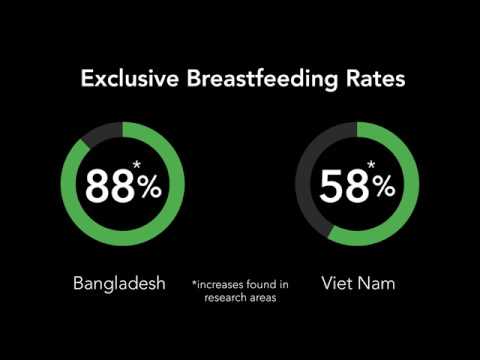A healthy start is the most important advantage a child can have. Evidence shows that exclusive breastfeeding is among the best ways that a mother can prepare a newborn for a healthy childhood. Yet global breastfeeding rates remain at a paltry 38 percent. To understand how to most effectively increase these rates, IFPRI has been providing research and evaluation support to interventions aimed at better health outcomes for babies and mothers worldwide, and has found encouraging results.
Our evaluation of interventions to support breastfeeding in Bangladesh and Viet Nam found that intensified interpersonal counseling (in combination with other approaches) provided dramatic at-scale gains in exclusive breastfeeding rates in both countries, suggesting that intensified approaches to boosting breastfeeding can achieve widespread success in countries across the globe.
Poor breastfeeding practices lead to up to 11.6 percent of deaths in children under five years old. Breastfeeding not only supplies adequate nutrition to a growing newborn, but also reduces vulnerability to illness. Breastfeeding also confers significant benefits to the mother, reducing the likelihood of facing postpartum depression, breast cancer, or type 2 diabetes. Nonetheless, these powerful reasons to breastfeed have not always translated to better feeding practices.
Our study examined efforts to boost the rates of exclusive breastfeeding using different forms of outreach, including: intensified interpersonal counseling; mass media; and community mobilization; all delivered alongside policy advocacy at the national level. We evaluated the population-level impact of programs using an intensified approach that included all four methods, to those that used a less intensive approach with standard counseling. These methods were supported with well-established programming from Alive & Thrive, a multi-year initiative working to improve child and maternal nutrition in various developing countries.
The study demonstrated that combining intensive interpersonal counseling with broader methods of outreach is quite successful in scaling up exclusive breastfeeding. In Bangladesh, exclusive breastfeeding rates nearly doubled, jumping from 48.5 percent to 87.6 percent in the intensive intervention areas. In Viet Nam, exclusive breastfeeding rates rose threefold from 18.9 percent to 57.8 percent. These dramatic gains demonstrate that with multiple forms of intensive outreach, including interpersonal counseling and other methods, the WHO goal of at least 50 percent of the population practicing exclusive breastfeeding for the first six months of a newborn’s life is within sight.
Importantly, these programs were delivered through different means. In Bangladesh, these practices were administered by a non-governmental organization called BRAC, while in Viet Nam they were provided through the government health care system. That the programs were so successful in both countries – using different service delivery platforms operating in differing contexts – shows promise for these methods to have positive outcomes in a number of diverse contexts.
Scaling up breastfeeding is the first step to promoting healthy newborns. As advocacy groups promote the practice around World Breastfeeding Week, research shows intensified counseling efforts, combined with supportive media, advocacy and community outreach interventions, can provide a blueprint for success.
Phuong Hong Nguyen and Sunny Kim are research fellows at IFPRI; Purnima Menon is a senior research fellow at IFPRI.







